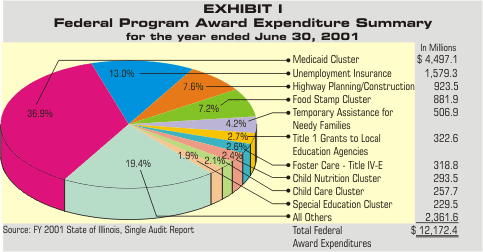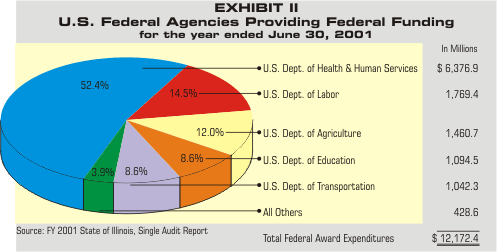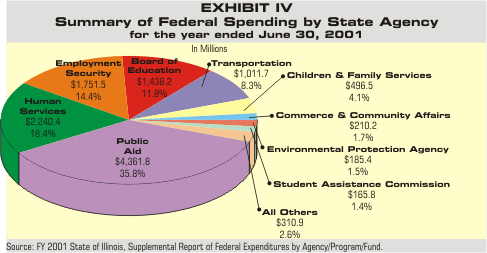Additionally, DCFS is not performing on-site monitoring visits to review internal
controls or the fiscal and administrative capabilities of its subrecipients. We noted that
none of the 50 subrecipients selected for test work had been subject to an on-site review
within the last three years.
Subrecipient monitoring procedures applicable to a pass-through entity requires
monitoring subrecipients activities to provide reasonable assurance that the subrecipient
is administering federal awards in compliance with federal requirements and that prompt
corrective action is taken on any audit finding. DCFS will then have information to assess
any impact in its ability to comply with applicable federal regulations.
As a result of the conditions noted pertaining to subrecipient monitoring, the auditors
qualified their report on two major programs - Foster Care and Adoption Assistance
programs. (Finding 01-18, pages 61 and 62)
We recommended DCFS implement procedures to ensure: (1) OMB Circular A-133 audit
reports are received within the 180 days as required; (2) desk reviews are performed
timely, including review of reports, follow-up on subrecipient findings and implementation
of Corrective Action Plans, receipt and review of applicable management letters, and
documentation of such review; (3) the reconciliation of the OMB Circular A-133 audit
report to financial information in subrecipient files; and (4) an evaluation of the
current staffing of the monitoring department to ensure resources are adequate. We also
recommended DCFS consider revising its on-site monitoring policy to include a risk based
approach for selecting subrecipients for on-site visits.
DCFS officials agreed with the recommendation and stated they are reviewing current
procedures and practices to strengthen the monitoring function and will be implementing
on-site visits where needed to resolve pending issues.
NEED TO IMPROVE COLLECTION RECORD DOCUMENTATION AT ISAC
The auditors were unable to determine whether the Illinois Student Assistance
Commission's (ISAC) loan records were updated within 10 business days of receiving the
information supporting compliance of special tests and provisions. This condition resulted
in an audit scope limitation. Total FY 01 federal program expenditures from the Federal
Family Education Loans program was $181,462,000.
The Commission's procedures do not include documenting the date loan information is
received from lenders, schools, borrowers, and others. Without the date of receipt of
information, ISAC cannot demonstrate that they complied with the provisions of this
program.
The program requires the Commission to maintain a complete record for each loan it
holds and must provide ready identification of each loan's current status, updated at
least once every 10 business days. (Finding 01-36, pages 97 and 98)
We recommended ISAC date stamp all source information that is received from lenders,
schools, borrowers, and others.
ISAC officials agreed with our recommendation and state they are modifying their
existing procedures to include date stamping all source information.
INADEQUATE SUPPORTING DOCUMENTATIONFOR PAYROLL COSTS AT ICJIA
The Illinois Criminal Justice Information Authority's (ICJIA) documentation to
substantiate payroll costs claimed for federal reimbursement does not exist. This
condition resulted in a qualification of the Byrne Formula Grant Program. Total FY 01
federal program expenditures from the several federal programs was $2,201,986. This total
amount is being reported as the amount of questioned costs.
ICJIA estimates the percentage of time employees will spend on each program and uses
this percentage throughout the year to allocate to payroll and fringe benefit expenditures
among federal programs. However, ICJIA does not require employees to document and certify
the actual time spent on each federal program.
Federal cost principles require the ICJIA to maintain personnel activity reports that
distributes their payroll and fringe benefits if they work on multiple activities. The
reports must reflect an after-the-fact distribution of the actual activity of each
employee. Also, where an employee works 100% on a single federal program, the ICJIA is
required to obtain a certification from the employee or their supervisor. (Finding 01-47,
pages 118 through 120)
We recommended ICJIA continue their work with the U.S. Department of Justice in
developing a methodology to track time spent on each program to include a procedure to
adjust budgeted time to actual time spent.
ICJIA officials accepted our recommendation and state they are continuing to work with
the U.S. Department of Justice and have reached an agreement on a time documentation
system for the federal payroll expenditures. Complete implementation of the new process is
expected to begin with the 2003 fiscal year.
IDHS NEEDS TO IMPROVE CASH MANAGEMENT AND ADVANCE ONLY THE IMMEDIATE CASH NEEDS TO
WIC SUBRECIPIENTS
The Department of Human Services (IDHS) provided funds in excess of their immediate
cash needs to subrecipients of the Special Supplemental Nutrition for Women, Infants and
Children (WIC) program.
We reviewed 25 payments to subrecipients totaling $18,390,623. We noted 13 of the
payments totaling $2,427,284 resulted in advances to subrecipients of more than 30 days of
funding needs. The number of days advanced ranged from 36 to 53 days. Total payments to
subrecipients of the WIC program were $31,748,000 for the year ended June 30, 2001.
The WIC program requires IDHS to monitor cash advances to subrecipients to ensure those
advances are for immediate cash needs only. Based on discussions with federal agencies,
"immediate cash needs" has been interpreted as being 30 days or less. As a
result of the conditions noted related to monitoring the cash management of subrecipients,
the auditors determined the IDHS was not in compliance with federal requirements. (Finding
01-12, page 50)
We recommended IDHS review its advance funding policies and techniques for
subrecipients to ensure subrecipients receive no more than 30 days of funding on an
advance basis.
IDHS officials accepted the recommendation and state they have implemented a procedure
to provide only 30 days of funding to WIC subrecipients.
IDPA FAILS TO FOLLOW TREASURY/STATE AGREEMENT (TSA)
The Department of Public Aid (IDPA) did not follow the clearance pattern specified
in the TSA related to the administrative and benefit payment cash draws for the Medicaid
program. Not following the agreed clearance pattern results in the State paying the
federal government an interest cost for the use of cash in excess of the agreed average
days a warrant takes to clear the State Treasurer's account.
The auditors noted that IDPA drew down federal cash (similar to prior years) based upon
the date the Comptroller's Office (IOC) charged the appropriation. The IOC's Statewide
Accounting Management Systems (SAMS) is designed to recognize an expenditure when
processing the invoice voucher (an approved payment) which usually correlates to the date
the warrant was issued by the IOC. However, when cash management practices are invoked by
the IOC, as was done during December, 2000 through April, 2001, the warrant issuance is
held awaiting adequate cash availability prior to release by the IOC. The period of the
delay from posting of the invoice voucher (expenditure posting to SAMS) to the actual date
of warrant issuance was up to two weeks. As such, IDPA drew down funds prior to the actual
issuance of warrants during this period which was not in compliance with the prescribed
funding technique. Additionally, IDPA did not calculate an interest liability which is
owed to the federal government for the delay in the disbursement of funds.
The State annually negotiates an agreement with the U.S. Department of the Treasury
which details the funding technique to be used for the draw down of federal funds. The FY
2001 funding technique required the use of the average clearance pattern for both
administrative and benefit payments. The average days of clearance agreed to was 6.2 after
the warrant is issued. (Finding 01-01, pages 27 and 28)
As a result of the conditions noted, the auditors (based on invoice voucher posting)
determined the Medicaid program cash draws were in excess of amounts disbursed (warrants
issued); and thus, was not in compliance with the TSA. This internal control deficiency is
a material weakness.
We recommended IDPA work with the IOC to establish procedures to ensure federal cash
draws are based upon the date the warrant is issued by the IOC.
Agency officials accepted our recommendation and indicate they will be working with the
IOC to acquire financial information based upon the date that warrants are actually
issued.
IDPA NEEDS TO IMPROVE MONITORING OF CHILD SUPPORT ENFORCEMENT SUBRECIPIENTS
RECEIVING FEDERAL AWARDS
The Illinois Department of Public Aid's on-site monitoring and other subrecipient
monitoring requirements was not evident on all Child Support Enforcement Program files
resulting in an inadequate monitoring process.
In a review of 8 subrecipients of the Child Support Enforcement Program, the auditors
noted no on-site monitoring procedures has been performed on 4 of the subrecipients during
the past 5 years. The on-site monitoring procedures would include a review of the
financial and programmatic records, an observation of subrecipient operations and/or
process for determining allowability and recipient eligibility. These 4 subrecipients had
expenditures of $1,165,583.
Additionally, 3 of the 8 recipients had not submitted the required A-133 audit report
and no follow-up by IDPA had been made for the current year. Total subrecipient
expenditures for the Child Support Enforcement Program were $27,278,000 for FY 2001.
Other problems noted were: (1) no formal procedures for tracking and performing desk
reviews of A-133 audit reports; (2) no process to identify those subrecipients required to
file A-133 audit reports but who have failed to do so; and (3) no formal documentation
process of performing (or the results thereof) A-133 desk reviews of audits.
The monitoring of the activities of a subrecipient is necessary to ensure that federal
awards are used for authorized purposes in compliance with laws, regulations, and the
provisions of contract agreements and that performance goals are achieved.
As a result of the conditions noted related to subrecipient monitoring, the auditors
determined the Child Support Enforcement Program not to be in compliance with federal
requirements. This internal control deficiency is a reportable condition. (Finding 01-05,
pages 36 and 37)
We recommended IDPA perform timely on-site monitoring visits which include reviewing
financial and programmatic records, observation of operations and/or processes for
determining expenditure allowability or recipient eligibility. Also, IDPA should establish
a uniform desk review performance process of OMB Circular A-133 audit reports and document
the results. Finally, IDPA should implement a process for tracking the submission of
subrecipient A-133 audit reports to ensure all reports are received in a timely manner.
IDPA officials state they have: (1) taken corrective action to insure all A-133 audit
reports are reviewed, and (2) initiated an on-site monitoring process using a risk-based
approach.
ISBE NEEDS TO IMPROVE MONITORING OF SUBRECIPIENT AUDIT REPORTS
The Illinois State Board of Education (ISBE) is not adequately reviewing OMB
Circular A-133 audit reports that are required to be received from subrecipients.
In the review of 240 subrecipient files for the various federal programs operated by
ISBE, the auditors noted A-133 audit reports were received and reviewed for findings which
were then conveyed to ISBE fiscal consulting staff for follow up. However, the desk review
process was not documented in the files which would indicate the procedures employed
during the desk review. Additionally, we noted there was no information in the files
indicating what procedures were performed during the desk review. FY 2001 subrecipient
expenditures for the 8 federal programs having subrecipient activities ranged from
$25,695,000 to $319,300,000.
ISBE is required to monitor the activities of subrecipients, as necessary, to
ensure that federal awards are used for authorized purposes. Further, ISBE should have an
effective internal control structure in place to ensure proper monitoring of subrecipients
and retain supporting documentation for a minimum of 3 years.
As a result of the conditions noted, the auditors determined the various federal
programs subrecipient monitoring activities was not in compliance. This internal control
weakness is a reportable condition. (Finding 01-28, pages 81 through 83)
We recommended ISBE implement the use of a desk review checklist and other procedures
to document and ensure that a sufficient review is performed.
ISBE officials state they have developed a formal desk review checklist which they
began using in FY 2002.
OTHER FINDINGS
The remaining findings pertain to other compliance and internal control matters. We
will follow up on the status of corrective action on all findings in our next Statewide
Single Audit for the year ended June 30, 2002.
AUDITORS' OPINION
The auditors state the Schedule of Expenditures of Federal Awards for the State
of Illinois as of and for the year ended June 30, 2001 is presented fairly in all material
respects.
____________________________________
WILLIAM G. HOLLAND, Auditor General
WGH:SES:pp
SPECIAL ASSISTANT AUDITORS
KPMG LLP were our special assistant auditors for this audit.


